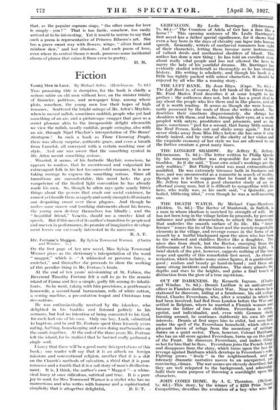Ots the first page of her new novel, Miss Sylvia
Townsend Warner gives us the dictionary's interpretation of the word • "maggot," which is----" A whimsical or perverse fancy, a crotchet," and thereafter she proceeds to show the working of this peculiar thing in Mr. Fortune's brain.
. At the end of ten years' missionizing at St. Fabien, the Reverend Timothy Fortune felt a call to go to the remote island of Fanua and live a simple, godly life among its inhabi- tants. So he went, taking with him provisions, a gentleman's housewife, a second-hand harmonium, rolls of white cotton, a sewing machine, a presentation teapot and Christmas tree decorations.
He was enthusiastically received by the islanders, who delighted in his baubles and listened politely to his sermons, but had no intention of being converted to his God, for each had one of his own. Only one boy, Lueli, submitted to baptism, and he and Mr. Fortune spent three leisurely years eating, bathing, housekeeping and even doing mathematics on the sands together. At the end of the three years Mr. Fortune left the island, for he realized that he had not really gathered a single soul.
I fancy that there will be a good many interpretations of this book ; one reader will say that it is an attack on foreign Missions and conventional religion, another that it is a skit on the Church's methods of salvation, a third that it is pure nonsense and a fourth that it is a sad story of man's disillusion- nient. It is, I think, the author's own "Maggot "—a whim- sical fancy at once ridiculous, satirical and true. It is a pure. joy to read, for Miss Townsend Warner is a stylist who has no Mannerisms and who writes with humour and a sophisticated -
simplicity that is altogether delightfule . - - . • _13;










































 Previous page
Previous page